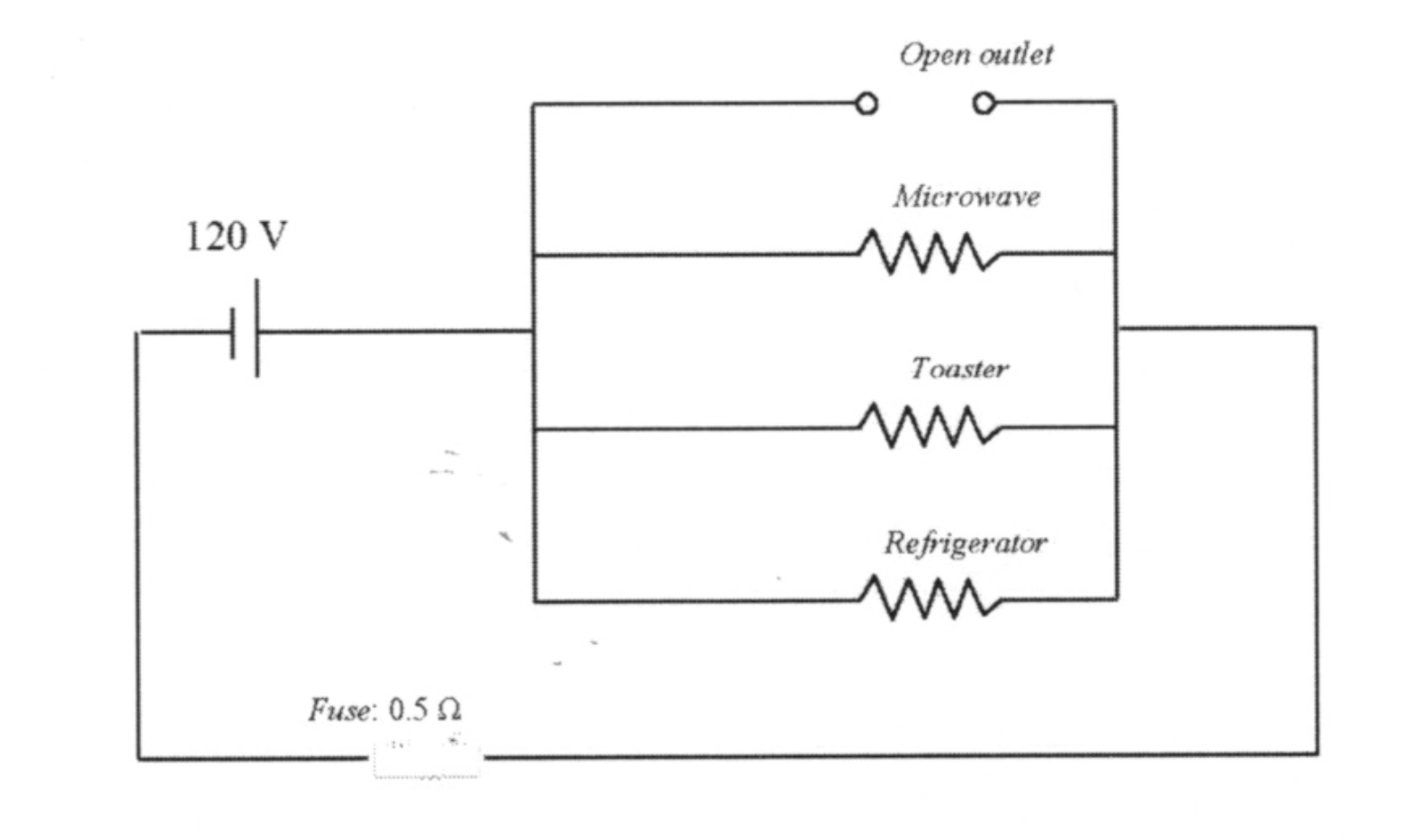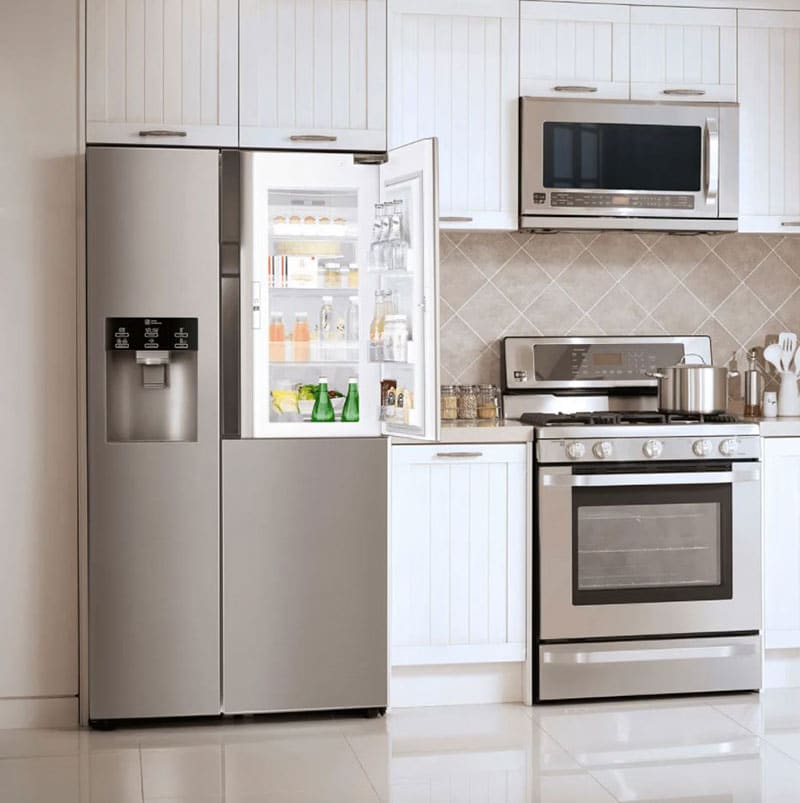Yes, a refrigerator and microwave can be on the same circuit. However, it is important to note that the microwave will draw more power than the refrigerator. Therefore, it is important to size the circuit breaker appropriately.
Additionally, it is important to keep the refrigerator and microwave on separate circuits if possible to avoid overloading the circuit.

Credit: www.hunker.com
Do the Refrigerator And Microwave need a dedicated circuit?
A dedicated circuit is exclusive to a single appliance or outlet. This is in contrast to a shared circuit, which supplies electricity to multiple outlets on the same circuit. Microwaves typically need their dedicated circuit because they draw a lot of power.
The National Electrical Code (NEC) requires that all microwaves have a dedicated circuit. This is because microwaves typically draw between 600 and 1,200 watts of power, which is more than most other appliances. If multiple appliances were sharing the same circuit, there would be a greater risk of overloading the circuit and causing a fire.
While it is technically possible to run a microwave on a shared circuit, it is not recommended. If you must do so, make sure that the other appliances on the circuit are not drawing too much power. You should also avoid using the microwave and other appliances at the same time.
Can a Refrigerator And Microwave share an outlet?
It’s common for people to want to know if they can save some money by sharing an outlet for their refrigerator. The answer is yes, you can share an outlet for your refrigerator, but there are some things you need to know first. For starters, you need to make sure that the outlet you’re sharing is not being used by anything else that draws a lot of power.
If you have a fridge and a freezer sharing an outlet, they will both be drawing a lot of power and you don’t want to overload the circuit. Another thing to keep in mind is that sharing an outlet can cause your fridge to run less efficiently. If your fridge is constantly running, it will use more energy and cost you more money.
So, if you’re thinking about sharing an outlet for your fridge, just make sure you consider these things. It can save you some money, but it’s not always the best option.
Does the refrigerator And Microwave require a dedicated circuit?

If you’re planning on getting a new Refrigerator And Microwave , you might be wondering if you need to get a dedicated circuit for it. The answer is maybe. It depends on the size of your Refrigerator And Microwave on your circuit.
If you have a small Refrigerator And Microwave, it is unlikely that you will need a dedicated circuit. However, if you have a larger Refrigerator And Microwave, or if your circuit is already close to capacity, then you might need to get a dedicated circuit. To be safe, it’s always a good idea to consult with an electrician before making any changes to your electrical system.
They can help you determine if you need a dedicated circuit and can help you install Refrigerator And Microwave if necessary.
Refrigerators and microwaves are essential appliances in most households, and ensuring their proper functioning is crucial for everyday convenience and food preservation. When it comes to Refrigerator And Microwave, both appliances have specific needs that should be considered to maintain safety and efficiency within the home. Let’s explore whether refrigerators and microwaves require dedicated circuits and why this might be necessary.
Refrigerators:
Refrigerators are typically large, high-power appliances that run continuously to keep food cold and fresh. As such, they require a steady and reliable source of electricity to operate effectively. While modern refrigerators are designed to be energy-efficient, they still draw a significant amount of power, particularly when starting up or cycling the compressor.
One common recommendation is to provide a dedicated circuit for the refrigerator. This means that the refrigerator is the only appliance connected to that particular circuit, ensuring that it receives an uninterrupted power supply and reducing the risk of overloading the circuit. Dedicated circuits for refrigerators are especially important in older homes or buildings with outdated wiring systems that may not be able to handle the electrical load of multiple appliances running simultaneously.
Having a dedicated circuit for the refrigerator also helps prevent potential issues such as tripped circuit breakers or voltage drops, which can occur when other high-power appliances are connected to the same circuit. Additionally, in the event of a power surge or electrical fault, a dedicated circuit can help protect the refrigerator from damage by isolating it from other electrical loads.
Microwaves:
Microwaves are another essential kitchen appliance commonly found in households worldwide. While they do not typically require as much power as refrigerators, they still draw a considerable amount of electricity when in use, especially during cooking or heating cycles.
Like refrigerators, microwaves can benefit from having a dedicated circuit. While it may not always be necessary, especially for smaller or lower-powered models, providing a dedicated circuit for the microwave can help ensure consistent performance and prevent electrical issues.
One consideration is the wattage of the microwave. Higher-wattage microwaves require more power to operate and may be more likely to trip circuit breakers or cause voltage drops if they are sharing a circuit with other appliances. In such cases, having a dedicated circuit can help prevent these issues and ensure that the microwave operates safely and efficiently.

Benefits of Dedicated Circuits:
- Safety: Dedicated circuits help reduce the risk of electrical hazards such as overloads, short circuits, and electrical fires by ensuring that appliances receive a consistent and uninterrupted power supply.
- Consistent Performance: Appliances like refrigerators and microwaves operate more efficiently and reliably when they have their dedicated circuits, minimizing the likelihood of performance issues or malfunctions.
- Convenience: Having dedicated circuits for essential appliances means you can use them without worrying about tripping circuit breakers or affecting other electrical devices in the home.
- Protection: Dedicated circuits help protect appliances from damage caused by electrical surges, fluctuations, or faults by isolating them from other electrical loads.
While not strictly required, providing dedicated circuits for appliances like refrigerators and microwaves can offer several benefits in terms of safety, performance, and convenience. By ensuring that these essential appliances have access to a stable and reliable power supply, homeowners can minimize the risk of electrical issues and enjoy peace of mind knowing that their appliances are operating efficiently and safely.
Can a microwave be next to a fridge?
Yes, a microwave can be next to a fridge. There is no danger in doing so, and in fact, it can be quite convenient to have them next to each other. The only thing to keep in mind is that the fridge will likely cause the microwave to work harder, so it is important to make sure that the fridge is not blocking the ventilation of the microwave.
Conclusion
Yes, a refrigerator and microwave can be on the same circuit. However, it is important to note that the refrigerator should be on its dedicated circuit. This is because the Refrigerator And Microwave are a high-powered appliances and can cause the circuit to trip if it is on the same circuit as the microwave.
We hope you found this post interesting. If you want to see more of our content, you can visit our website Wehomedeco.com for more articles, tips, and resources. You can also follow us on social media to stay updated with our latest posts. We would love to connect with you and hear your feedback. Here are our social media links:
2 thoughts on “Can A Refrigerator And Microwave Be On The Same Circuit – Easy Guide 2024”